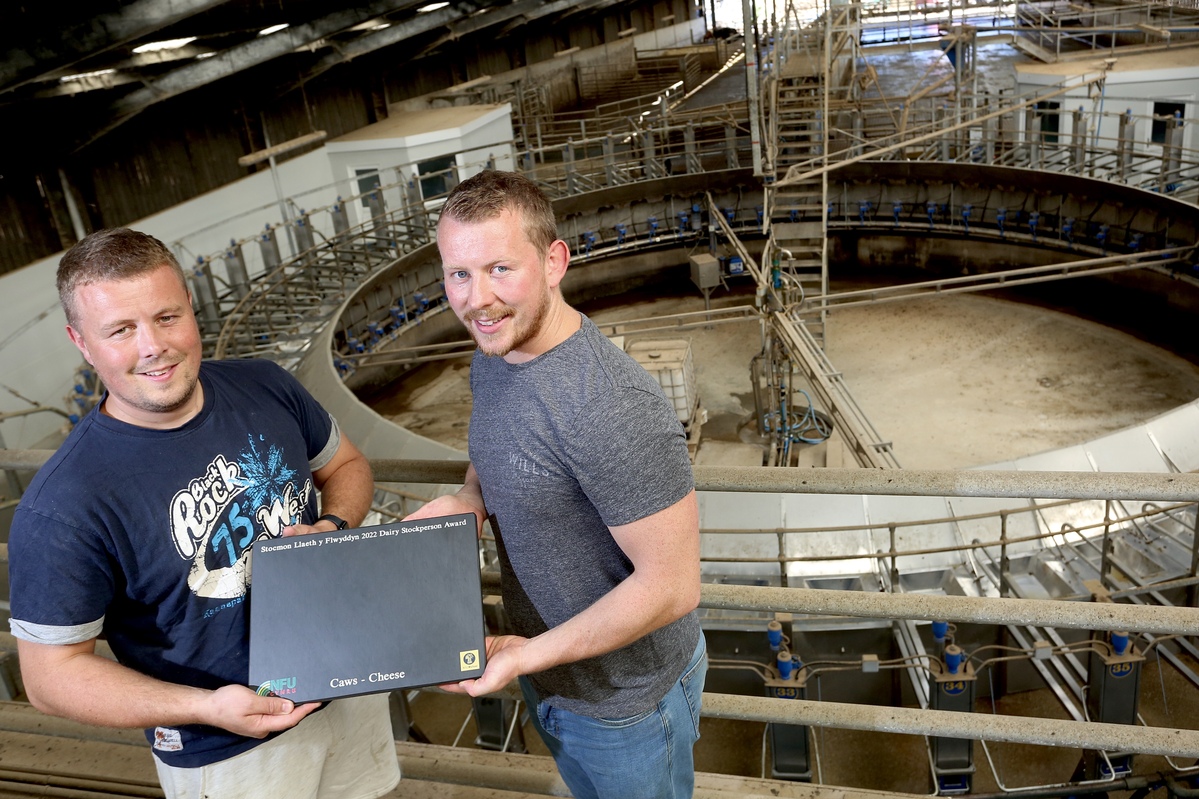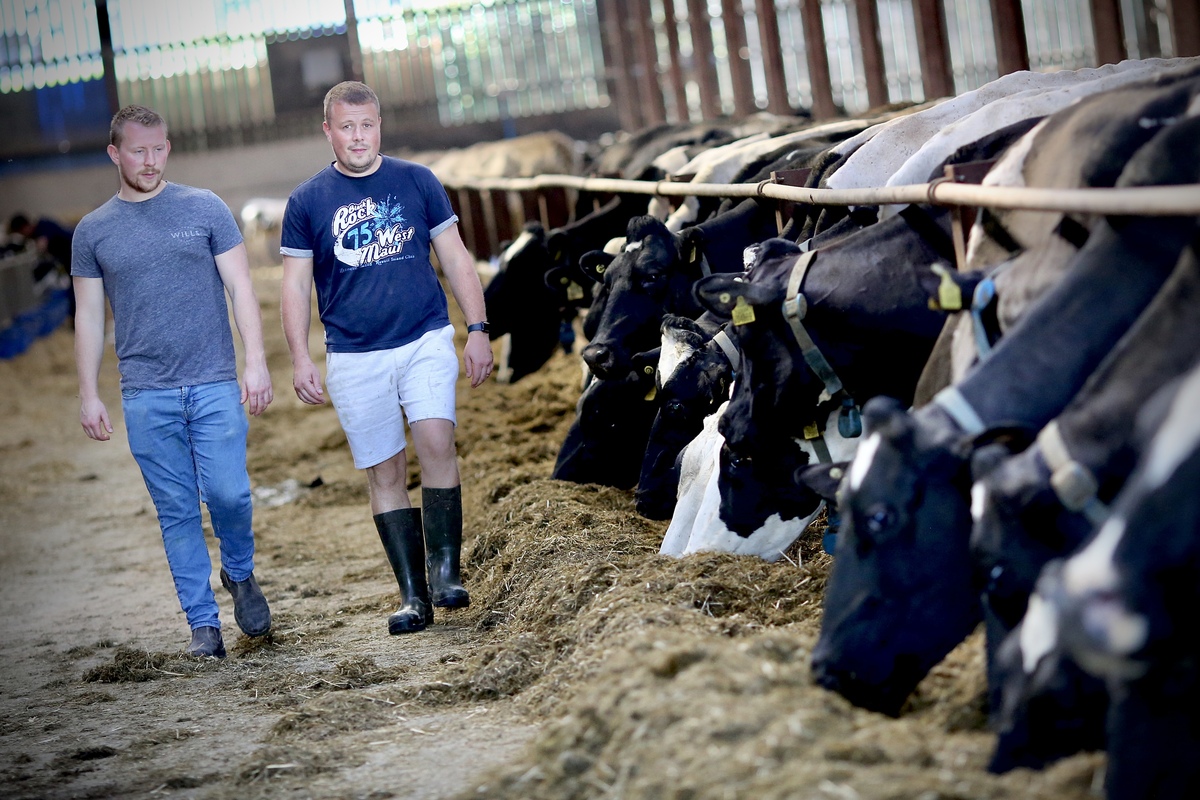Farming Wales reporter Debbie James spoke to Sion and Gareth Roberts, winners of the 2022 NFU Cymru/NFU Mutual Welsh Dairy Stockperson of the Year Award, to learn how that mindset is helping to drive success on their Anglesey farm.
The nation's early risers
Dairy farmers are unrivalled as the nation’s early risers. At one time brothers Sion and Gareth Roberts and their father, Twm, were surely among the earliest when they fired the parlour up at 12.45am for the morning milking.
It wasn’t a lifestyle choice but a necessity to allow time to get the herd milked before the tanker arrived on the farmyard at 6.30am.
Herd size had expanded exponentially when Sion and Gareth came home to farm but what hadn’t grown was the parlour with those bigger numbers milked in a 16/32 swingover; from ‘cups on’, the morning and afternoon milkings took a grueling five and a half hours.
“It was heavy going,” Sion admits.
Major investment
It wasn’t sustainable and changing that situation required major investment with a 60-point rotary parlour installed in 2018.
December 19th 2018 is a date that will be forever etched in the family’s memory as this was the day that the cows were first milked in the rotary. “It made a massive difference,” Sion recalls; milking times reduced to under two hours, even though there were more cows in the herd.
Cow numbers have peaked at 500 and the acreage farmed 1,200 acres - a vast increase on the 30 cows and 40 acres that Twm started his farming career with when his own father bought Fferam y Llan at Cerrigceinwen, on the island of Anglesey.
Twm with his wife, Nerys, steadily grew the business, buying and renting land as opportunities came their way.
When Sion came home to farm there was significant expansion with cow numbers increasing to 300 to support two families. The second major growth came when Gareth joined the business.
Seizing every opportunity
In an area where competition for land is fierce, they have seized every opportunity that has arisen.
Half the land they farm is rented and they take care to be model tenants. “We always look after a place when we farm it, it is one of the reasons why we do get offered farms when they come up,” Sion believes.
Last spring they were offered a bit of neighbouring land which allowed the grazing platform to increase from 150 acres to 205.
“With more access to grazing, it has made a massive difference to the way we run the herd,” says Gareth.
The business model
The business revolves around a closed herd of Holsteins, with an unwavering focus placed on maintaining high performance.
The twice-a-day milked herd is currently averaging 9,500 litres at 4% butterfat and 3.3% protein with the milk processed into mozzarella at the Leprino creamery, formerly Glanbia, at Llangefni.
The family are ‘very very keen’ on the Holstein breed.
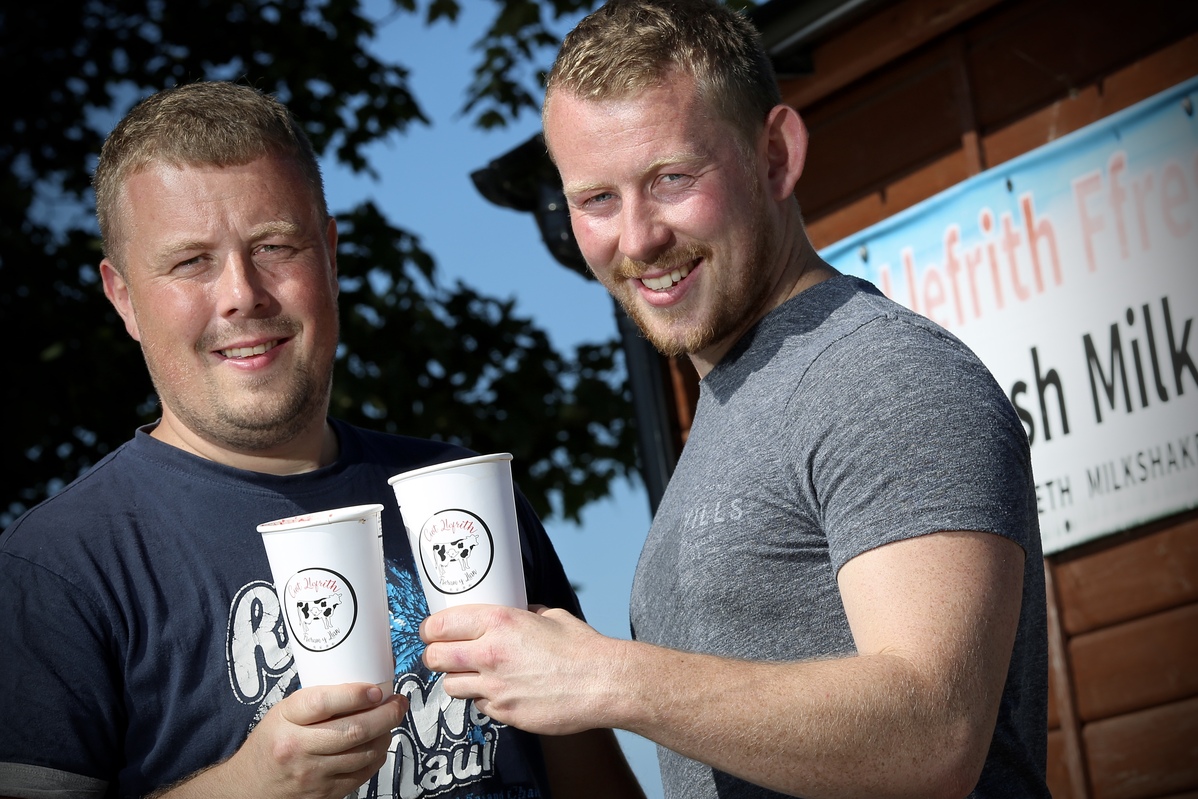
The herd frequently wins prizes in the Old Gwynedd Milk Recorded Herds competition. “The herd isn’t pedigree but we take a lot of pride in having nice tidy cows,” says Gareth.
Herd health is a priority; there is weekly foot trimming and mobility scoring to keep lameness rates low.
'Game changer'
Mastitis rates have halved along with antibiotic use since the business invested in a machine that identifies mastitis-causing bacteria and prevents resistance by matching it to a treatment, described by Sion as a ‘game changer’.
“Before we had the machine we would try one antibiotic after another to try to cure a case because we didn’t know which treatments the bacteria were resistant to.
“It relies on working closely with our vets, Wern Vets, they look at the result and look at whether or not it needs treating and with what.”
Significant progress in reducing antibiotic use recently earned the Roberts’ an award from the Responsible Use of Medicines Association.
There have also been big improvements in fertility with the calving index currently at 372 days and a conception rate of 41% using sexed semen.
All the progeny from the animals inseminated to beef are sold for rearing. “When milking times were silly we were running around trying to do everything and not doing a good enough job so we stopped rearing our beef calves,” Sion explains.
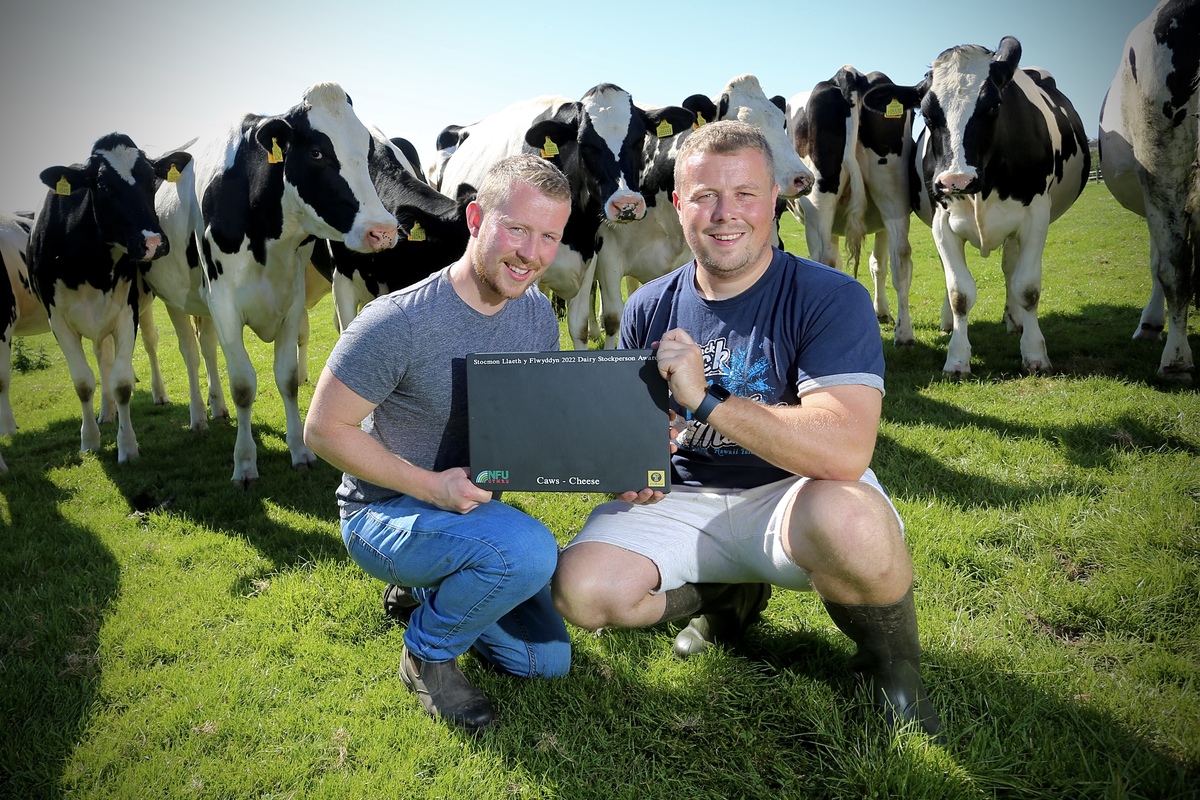
Breeding strong cows
“There is a massive demand for them because they are out of Holsteins that aren’t too extreme, we breed strong cows.”
Nutrition is another area where gains are being achieved, with a reseeding programme and multi-cut silaging.
Italian ryegrass is gradually being replaced with eight-to-10-year perennial leys. “We found that the Italians were getting a bit stemmy by the time we were hitting the dry periods in the summer, the leys were tall but thin and we were losing quality,” says Sion.
Four cuts of silage are taken, sometimes a fifth. The quality is such that in 2021 the farm came second in the National Federation of Grassland Societies’ clamp silage competition.
When the herd is housed, usually in mid-October, the ration is a simple one of grass silage, 0.5kg straw and a blend and topped up with concentrates in the parlour up to a maximum of 8kg.
No use of Soya
Soya is no longer fed, replaced by prairie meal and protected rape, which attracts a milk price bonus of 0.4 pence a litre.
“It doesn’t earn us any more money because that bonus covers the extra cost of feed but it is good for our carbon footprint and removing soya has made no difference to milk production,” says Gareth.
Value is added to both slurry and milk.
Adding value to the business
An average of 40 tonnes of slurry is supplied daily to a nearby digester and some milk is sold direct from a vending machine.
The vending machine milk sales started as a Covid-19 lockdown project and it has grown with the introduction of machines providing coffee and snacks, including locally made ice cream and cheesecake.
Those extras have been key to generating additional footfall in a market that is becoming increasingly crowded.
“There are now four vending machines on the island, without the tourists it would be difficult to make a living from vending if there were more,” says Sion, whose wife, Lois, takes care of the day-to-day running of this side of the business.
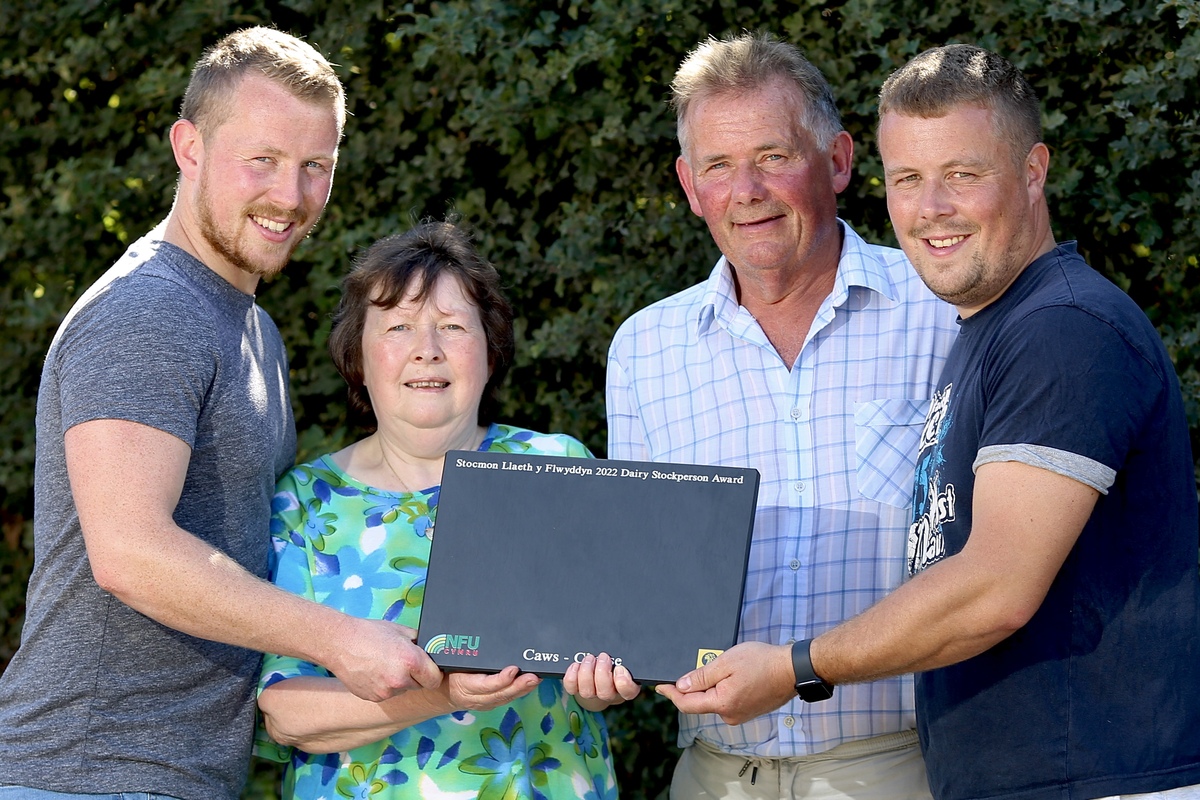
Farm visits
Although the farm had long hosted visits by the local school, it was the milk vending and the marketing around it that led to a big growth in the number of schools and colleges now visiting – there can be two visits a week.
The Roberts family don’t charge and give the children free milkshakes, simply enjoying educating the next generation.
It could even be a means of recruiting the future workforce, as one visit illustrated.
“The children ask questions as they go around and I remember one young boy, who must have been about six and whose father ran the local shop, telling me that he was going to come and milk for us one day and sell the milk from his father’s shop,” Sion recalls.
The current workforce consists of two full-time members of staff, a part-timer and a relief milker for the morning milking.
The next generation
Sion and Lois’ four daughters, 16-year-old Elliw, Mari, who is 13, Sara, 10, and eight-year-old Beca, are also important members of the team.
“Elliw does tractor work, AI, the calves, everything. Mari is very hands on, as well, and is really interested in the farm," says Sion.
“The girls have friends who have no connection with farming but who love to come here and lend a hand too.”
Lois, and Gareth’s fiancé, Gwen, who he will marry on New Year’s Eve, also get involved in work on the farm.
The family’s approach to running the business is to be efficient, and to always question their spending, to be wise enough to not spend when times get tough.
“If we want to make a big purchase we ask ourselves ‘do we really need it?’,” says Sion. “We never skimp on the cows though.”
The family also work well as a team. And their secret to that? “We are so busy we don’t have time to argue!” laughs Sion.
“We all try to have a say too. We are very lucky that dad and mum trust us to make big decisions.”
As they look to the future, it’s not further herd expansion that they are chasing. “We are happy with the numbers we are milking now, we are getting good performance out of the cows, we are constantly improving and trying to better ourselves,” says Sion.
“In an ideal world we would have 100 fewer cows and still make the same amount of money.”
Dairy Stockperson of the Year Award
NFU Cymru and NFU Mutual are on the search for the 10th winner of their Dairy Stockperson of the Year Award.
The award seeks to champion dedicated, committed and enthusiastic dairy stock managers from across Wales.
Nominations are invited throughout Wales. Anyone is welcome to nominate a dairy farmer, manager or worker, or themselves.
If you are interested in entering, or know someone who you think is worthy of a nomination for the title of Dairy Stockperson of the Year 2023, follow the link below.
